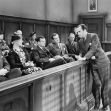Muskingum County Judge Mark C. Fleegle has been disqualified from two cases scheduled for this month after complaints that Fleegle has not followed COVID-19 safety protocols in his courtroom.
The complaints came from a Columbus, Ohio lawyer, Harry Reinhart. Reinhart, who is 69, was dissatisfied with the lack of safety measures taken to prevent the spread of COVID-19 in Fleegle’s Courtroom. Some of the things Reinhart alleges include Fleegle's decision to continue in-person hearings instead of holding virtual hearings, as well as not requiring facial coverings to be worn inside the courtroom.
Reinhart expressed his concern because he is someone who is at higher risk if he were to contract the virus. He felt that the judge's lack of adherence to safety protocols risked his health and the health of the trial participants. Reinhart also points to the fact that the judge ignored recommendations from the Chief Justice as well as the governor's statewide mask order.
Jude Fleegle responded to the allegations in Reinhart’s affidavit by saying that the Chief Justice's recommendations were just that, recommendations not rules. Fleegle also defended his stance by saying that his courtroom was large enough to accommodate social distancing and that he regarded himself and his jurors as essential employees who needed to “continue to proceed in order to keep our system of government intact.”
Because of the complaints, Judge Fleegle expressed that he would have new safety protocols implemented. His new protocols would include the requirement that everyone must wear face masks, although Judge Fleegle also said that he would continue to not wear his face mask while on the bench and that anyone who testified would not wear one either. Attorneys would be allowed to lower their masks when they were speaking, and all individuals who entered the courthouse would be given a temperature check before entering. Fleegle also shared that anyone who was uncomfortable with the safety measures would be able to leave. However, when Fleegle was asked to provide the written details of his safety protocol plan in preparation for his upcoming trials, Fleegle said that he did not have one.
Judge Fleegle's disqualification from two trials this month bears a striking resemblance to the recent disqualification of Ohio Judge Christine Croce. In Judge Croce's case, two defense attorneys alleged that Judge Croce wanted to continue with a capital jury trial that was suspended because of the pandemic. The two attorneys accused the judge of having a blatant disregard for the health and safety of those at trial because Croce had only implemented some of the safety measures that were recommended by public health officials.
The difference between the two cases is that Judge Croce was accused of failing to adhere to safety protocols during June 2020 when the pandemic was in full swing but managed, whereas Judge Fleegle's case takes place during what is believed to be the pandemic's highest peak.
Although the Ohio Attorney General has announced that judges can suspend trials if they feel it necessary as a way to limit the spread of the virus, the affidavit indicates that there is no reason for Judge Fleegle's scheduled trials to continue in the first place.
The combination of allegations and Judge Fleegle's lack of a written protocol detailing safety measures in the courtroom have led the Ohio Supreme Court Chief Justice Maureen O’Connor to remove Judge Fleegle from two upcoming cases this month. O’Connor explained the following regarding Fleegle’s approach, “Without written procedures, no one will know what is expected of them upon entering Judge Fleegle’s courtroom. Indeed, Mr. Reinhart avers that if Judge Fleegle recently decided to require face masks, he failed to communicate that change to the practicing bar. Further, unwritten (and unknown) policies cannot be effectively enforced.”
O'Connor goes on to add, “He failed to specify how he intends to minimize contact between jurors and to keep counsel, the defendant, and the public six feet apart. Nor did Judge Fleegle identify any plan for sanitizing his courtroom. Even if Judge Fleegle is convinced that he can preside over a safe jury trial without any sort of written protocol, he should recognize that other people take public-health recommendations very seriously and that the health concerns of attorneys and parties should be an important factor in deciding whether to proceed with jury trials during this phase of the pandemic.”






